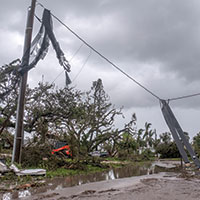 Storm-related emergency pay costs Vero $400K
Storm-related emergency pay costs Vero $400K
STORY BY RAY MCNULTY (Week of November 7, 2024)
The Vero Beach city government paid its employees more than $400,000 in overtime and emergency wages for their work responding to the damage done by the tornadoes and torrential rains spawned by Hurricane Milton last month.
Records provided last week by City Manager Monte Falls showed that 247 municipal employees worked nearly 8,500 hours of overtime between 6 a.m. Oct. 9 and 6 p.m. Oct. 16.
Falls said the city will apply for Federal Emergency Management Agency funds to cover the additional expenditures resulting from the storm.
“This was a declared emergency,” Falls said, “and the city responded immediately with all the resources we had available to us.”
Among the city employees summoned to work overtime were eight department heads, including Public Works Director Matt Mitts, Water & Sewer Director Rob Bolton and Police Chief David Currey.
The department heads, despite being salaried employees, were paid nearly $10,000 combined for the additional hours they worked. They were eligible for overtime under the city’s “Emergency Personnel and Pay Policy,” which became effective in June 2018.
The policy was created to address future conflicts with union contracts after Hurricane Matthew – a Category 4 storm – took aim at Vero Beach before veering east and only brushing our community in early October 2016.
“Another hurricane season was beginning, and there were real questions as to how long we could work an employee during an emergency and how we would pay them,” now-retired City Manager Jim O’Connor said in a phone interview last weekend.
“So, we came up with a policy that allowed emergency pay to kick in,” he added, “and it overrode all of the union contracts.”
According to the policy, which takes effect immediately upon the City Council or city manager declaring an emergency: Hourly, overtime-eligible employees are paid at twice their base rate (double time) for each normally scheduled hour they work during the emergency period, and at 1.5 times (time-and-a-half) their base rate for any hours they work beyond their regular shifts.
But department heads, too, are covered.
Despite being salaried employees, the city’s department heads are eligible for overtime when they work additional hours during emergencies, as was the case when the Oct. 9 hurricane threatened the community.
Unlike hourly employees, however, department heads are paid straight time for the additional hours they work, their rate based on what their hourly pay rate would be if they were not salaried.
“The reason we did that was because, during hurricanes, some department heads have to stay overnight at the Emergency Operations Center,” O’Connor said. “We needed to compensate them for that time away from their homes and families at a difficult time.”
As for why department heads are paid only straight-time wages for their overtime hours worked during emergencies, O’Connor said they were already getting salaries.
“I had never worked anywhere where salaried employees were paid overtime,” he said. “Then again, I had never worked anywhere where I had to deal with hurricanes.”
For those wondering: Mitts worked 41.5 additional hours during this emergency, Bolton worked 25, and Currey worked 21.5, while Airport Director Todd Scher worked 26 extra hours and Marina Director Sean Collins worked 10.
The three council-appointed charter officers – city manager, city attorney and city clerk – are salaried employees who are not paid for any additional hours their jobs might require, even during emergencies.
For the city to pay those officers overtime during emergencies, Falls said, might create the appearance of a conflict of interest, since the city manager has the authority to declare a state of emergency.
“As far as I’m concerned, working during emergencies is part of the job,” he said. “I’ve already worked more than 500 hours beyond my normal hours this year.”
A chunk of those hours was spent leading the city’s response to the tornadoes that damaged parts of downtown and devastated a stretch of Central Beach on the west side of State Road A1A, from Riomar to Bethel Creek, before heading out to sea just south of Indian River Shores.
The carnage left behind in the Central Beach community included: torn-off roofs, segments of which landed in roadways and neighbors’ yards; shattered windows; damaged vehicles; uprooted trees, signs and light poles; downed power lines; and blocked streets.
Mayor John Cotugno called the city’s response in the storm’s aftermath “exemplary,” saying the employees who worked throughout the emergency “discharged their duties to best serve the citizens and ensure the public was safe and sound.”
The mayor also defended paying salaried department heads for the additional hours they worked.
“We’re talking about a declared emergency, not standard overtime for any other reason,” Cotugno said. “You’re asking people to go above and beyond to do a job that is essential during an emergency. They deserve to be compensated.”



